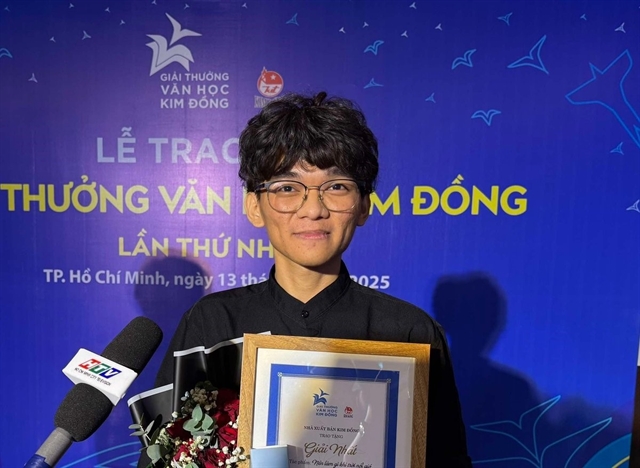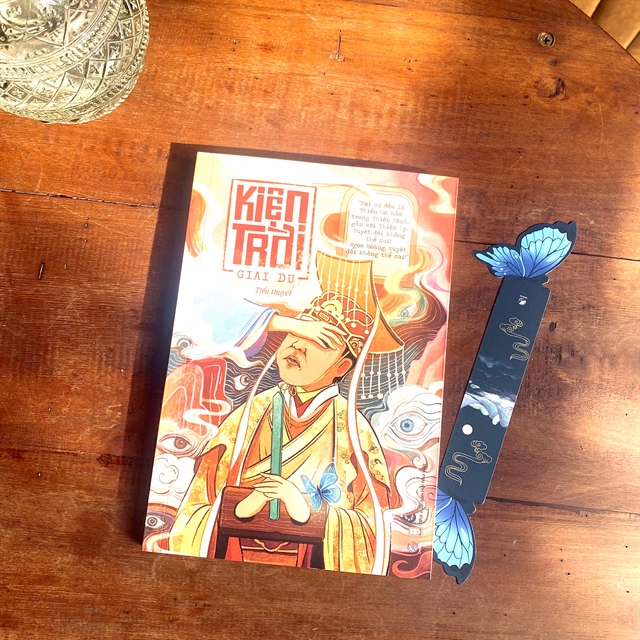 Life & Style
Life & Style

 |
| Đặng Văn Giàu receives the First Prize at the Kim Đồng Literature Awards. — Photos thethaovanhoa.vn |
The novel entitled Nên Làm Gì Khi Trời Nổi Gió (What to Do When the Wind Blows) has earned its author, Đặng Văn Giàu (pen name Giai Du), the first prize at the first-ever Kim Đồng Literature Awards.
The awards started accepting submissions in 2023 and received 612 entries in total, with just 11 works selected for prizes.
Giai Du, 24, has published three books and is currently studying for a master's in literary criticism and theory at the University of Social Sciences and Humanities in HCM City.
He spoke with Thể Thao Văn Hóa (Culture & Sport) daily about his literature career.
Could you tell us about the story?
I spent time thinking about it, but wrote the story in one month. It's about the little things in life. Through the story, I want children to gain love for everyone and everything around them.
The most important thing in writing for children is knowing how to see the world through their eyes.
My mother inspires my writing. When she was small, she liked reading very much, but she didn't have many books. I want to write stories for her.
How many activities do you list in What to Do When the Wind Blows? Why do you list these things in the story?
The story has a total of 20 things to do when the wind blows, all suggested by the main character. Each contains explanations, but it's not what it looks like.
I think that the number 20 is enough for a long to-do list for a child. It is not intended to be a one-time suggestion, but rather something we will do throughout our lives. So this number also ensures diversity for the to-do list.
How many of these don't come from reality, or are just for thought?
This is a completely fictional story, but there are no magical details, so all the things on the list are everyday things that a child (or adult) could do.
There will be some things on the list that are very easy to do, but there will also be some that are a little more difficult, and I think they all have their own unique qualities.
What is the difference between this novel and your other books?
This is my only work so far that is written for children. So it will definitely be very different from my previous works. This story has a special structure which is not found in my previous books. Readers will therefore find a very different style, with very different characters and stories.
Children are always difficult to understand — we should admit this. There are problems that are simple for adults, but complicated for a child. On the other hand, there are problems that are complicated for adults, but simple for children. It is therefore extremely difficult for adults to write about children.
 |
| One of Giai Du's books published by the Writers Association Publishing House. |
Are you inspired by folk tales?
Folk materials do come into my writing. They are embedded in my writing naturally, rather than by choice.
Folk elements in my writing, if any, come from the process of hearing about them daily, until they become internalised, and they arise subconsciously when I write. Everything comes so naturally that sometimes the author himself does not even realise it.
For me, folk elements are materials that we can highlight or think about using depending on the situation and purpose of the writing.
With What to Do When the Wind Blows, it seems that there are a few folk materials used, or perhaps they have integrated into the work so deeply that I myself don't even recognise them.
You are studying literary criticism and theory. Does literary criticism make you become a good writer?
I love everything related to literature including reading, writing and researching. Learning logical thinking and acquiring knowledge about aesthetics and literature as well all interest me.
When I write, I separate myself from the role of literary researcher, and just become a pure creator. I feel quite lucky to have found the middle ground between theory and writing, so as not to get too carried away with either side.
In between, I can see both sides. Researching helps me see others, and writing helps me see myself. Right now, I feel like the two don’t interfere with each other, except that they compete for limited time. I have to manage to balance these two versions.
Writing, no matter the subject or content, is an activity that needs courage, like living. I hope we all have the courage to live and write. — VNS